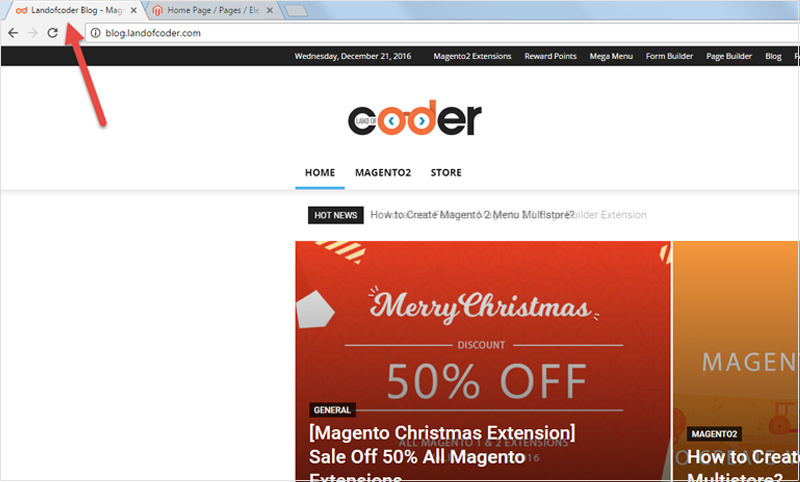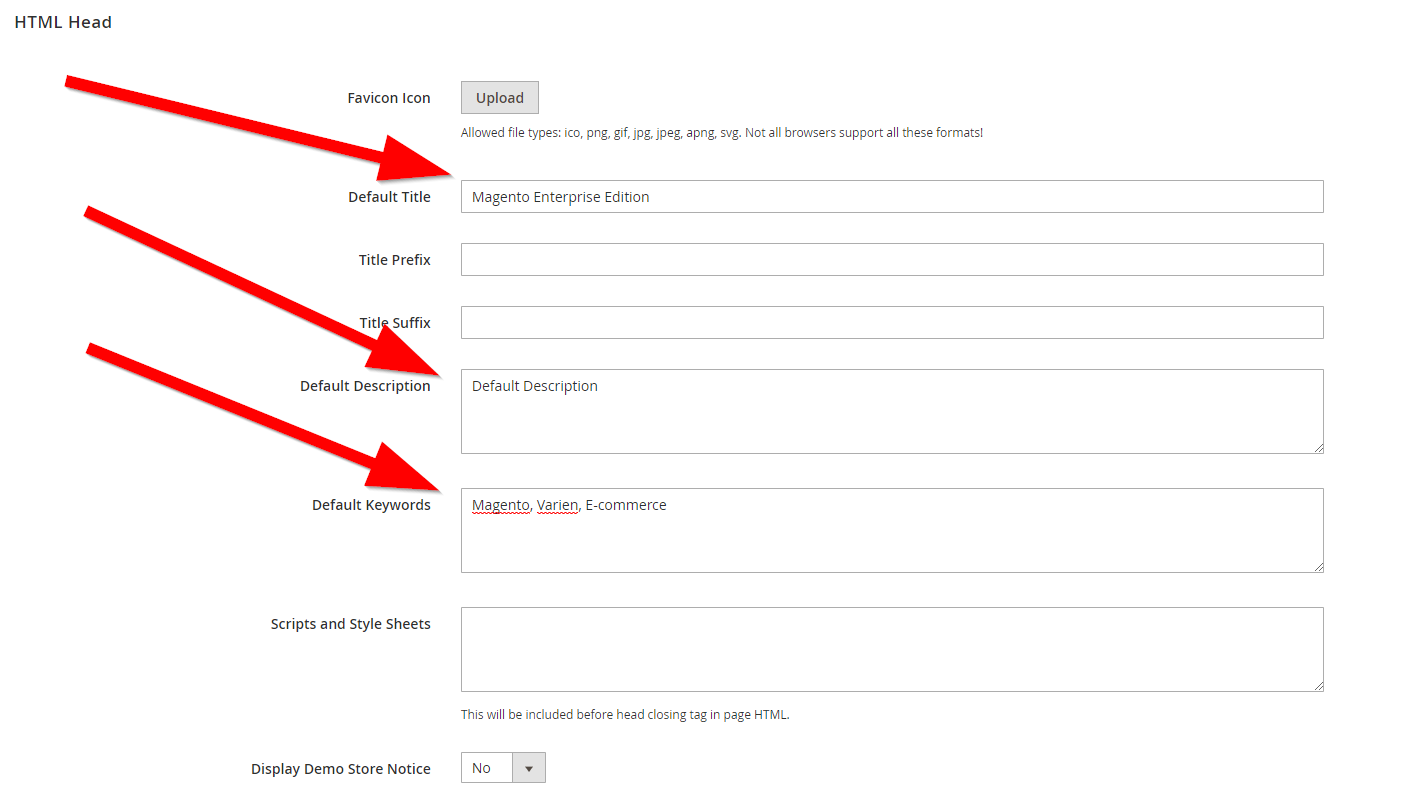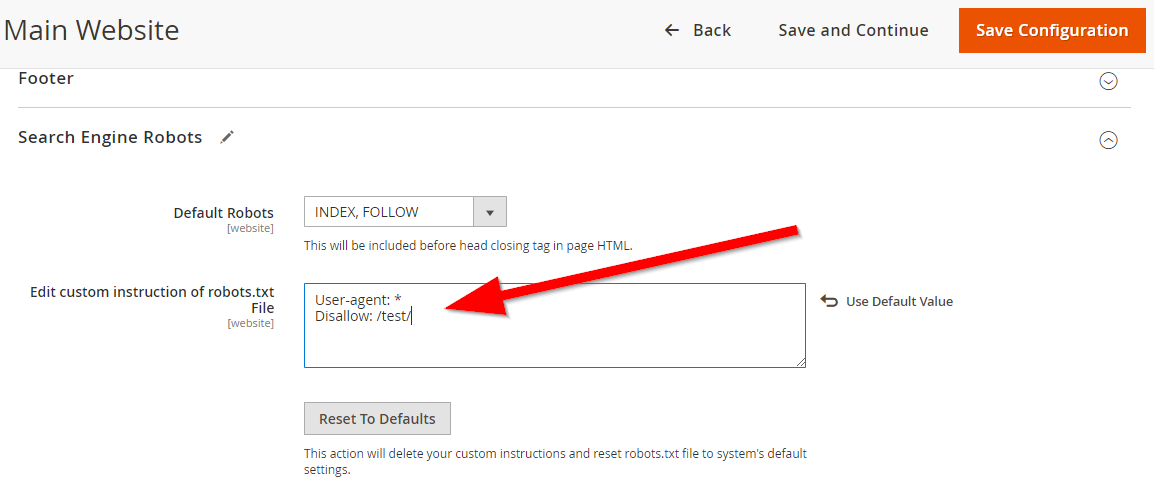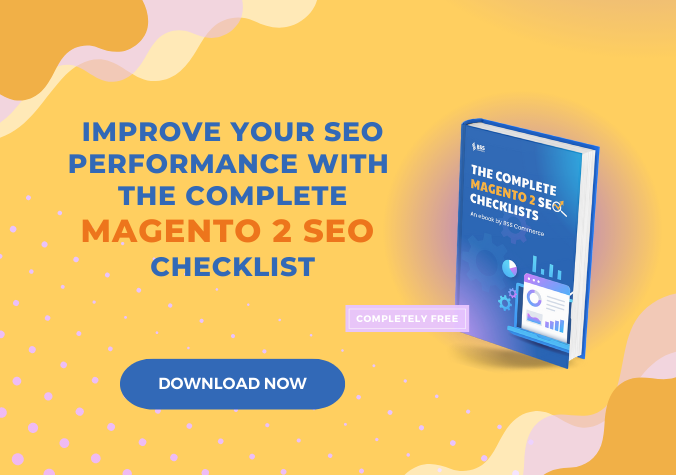If you have trouble with Magento SEO Issues, don’t ignore this post for valuable tips to follow the Magento SEO checklist easily.
Like every website, SEO issues are enemies of ranking of stores based on the Magento platform. To reach the goals of organic traffic with high conversion, it’s urgent to track SEO elements on your Magento website now and do fixes timely if there is any problem.
But first, let’s look through these 10 common Magento SEO issues with the instructions to fix them.
10 Most Common Magento SEO Issues with Fixing Instructions
Table of Contents
Using default homepage title and description
Nobody can deny the importance of titles in SEO. In the default homepage setting of Magento, the title is ‘Homepage.” Lots of store admins ignore this Magento SEO issue and do not make use of this element to show something meaningful or promote their brand.
Do you agree that the text “Homepage” is so boring and unattractive to web browsers?
# How to add Homepage title?
- From the admin panel, choose Content => Pages
- Choose Homepage => Edit, enter the new title

Using default description
Not only Meta Title, but Meta Description also plays a critical role in SEO. In spite of this fact, few admins still make a mistake when they leave description boxes blank.
Can you guess what will happen? All pages without description will have duplicate descriptions as the default text.
# How to fix this Magento SEO issue?
The simple way to avoid duplicating descriptions is to erase the default description in the backend.
- From the backend, navigate Content => Configuration, choose the scope that you want to apply this setting and click Edit
- Under the HTML Head section, you will see Default Meta Description Box
- Make this box empty

Slow page speed
Page speed refers to the time it takes to fully display the content of a page and has been used by Google’s algorithm as a signal to rank pages. Slow page speed or load speed is a very common Magento SEO issue.
Research has shown that Google may be specifically calculating the time to the first byte as when it considers page speed. Furthermore, a slow page speed means that search engines can crawl fewer pages using their allocated crawl budget, and this could badly impact your indexation.
On the other hand, slow page speed also negatively affects user experience. If your page speed is slow, that page is likely to have a high bounce rate and low time on page. Finally, all of those things might harm your conversion rate.
# SEO tips:
You can frequently evaluate your page speed through Google’s PageSpeed Insights to realize timely if it is slow. If you are definitely in this problem, we recommend these tips to improve your page speed.
- INSTALL Magento 2 Lazy Load for free to allow loading product images when scrolling down the pages => reduce loading time => and better SEO performance

- Minify CSS, Javascript, HTML and optimize your code (including removing spaces, commas, and other unnecessary characters)
- Reduce redirects because every time a page redirect to another, it takes visitors additional time to wait for the HTTP request-response cycle to complete
- Use a CDN (Content Distribution Network) to distribute the load of delivering content
- Optimize images by using the right format. For example, PNGs are generally suitable for graphics, while JPEGs are better for photographs.
Also, you can rely on a Magento Code Audit Service to let them check the code analysis and make recommendations to eliminate any coding issues, including speed problems.
Missing URL rewrites
Magento URL Rewrite is used to change any URL associated with a product, category, or CMS page. Once you enable the Rewrite, any links pointing to the previous URL will be redirected to the new one. Therefore, you cannot miss URL rewrites if you want to turn unfriendly URLs into better ones.
URL rewrites account for the most common Magento SEO issues faced by Magento merchants.
# How to enable Magento 2 URL Rewrite?
- On the admin panel, click Store => Configuration => General => Web
- Expand the Search Engine Optimization section
- Set Use Web Server Rewrites as “Yes”
- Click Save Config to finish

READ Magento 2 URL Rewrites Tutorial for more instructions on related configurations.
Duplicate content
We all know that duplicate content can badly affect search engine ranking because it creates difficulties for search engines to decide which version of content is more relevant to submitted search queries.
For search engines, they don’t know which version to include or exclude from their indices. Furthermore, they don’t know whether to direct the link metrics, including trust, authority, link equity, etc. to a page and separate it between multiple versions.
For store owners, duplicate content can dilute link equity. When internal links point to multiple pieces of duplicate content, they spread the link equity among the duplicates.
# How to fix this Magento SEO issue?
There are three main ways to fix this issue.
- Set up a 301 redirect from the duplicate pages to the original page
- Use Canonical Tag (Rel=Canonical) in the HTML head of each duplicate page to tell search engines which one is the original version
- Use the parameter handling in Google Search Console to specify whether Googlebot should crawl several URL parameters differently
Missing canonical URL
As referred to, Canonical Tag is an SEO element that plays a crucial role in telling search engines which URL is the original version if you have multiple pages with the same content. Then, they know which version you want to appear in SERPs.
For that reason, the omission of Canonical attributes means you let Google mark your content as duplicate. Once the duplication is on a large scale, it may dilute your ranking equity.
# How to enable Canonical Tag in Magento 2?
- On the admin panel, click Store => Settings => Configuration
- Under Catalog panel, select Catalog
- Open Search Engine Optimization section
- Set Use Canonical Link Meta Tag For Categories and Use Canonical Link Meta Tag for Products as Yes/No according to your purposes.

Including staging URLs in XML Sitemap
Lots of site owners do not care about optimizing the XML sitemap and include unnecessary URLs. Unfortunately, a too long or messy sitemap is not SEO-friendly and impacts its effectiveness.
A staging server is used during the development process of your online store to test any change you make. But some admins forget about the difference between the URL of a staging and live site and forget to remove those URLs.

For that reason, always remember to include on your XML sitemap the right URLs from the live site. Besides, also make sure to include noindex/nofollow before you use the staging server to prevent it from getting indexed by crawlers.
READ MORE Overall Explanation Of Magento SEO Sitemap for further understanding about sitemaps in your store.
Using keyword stuffing
Many people think that repeating as many target keywords as possible is good practice. However, stuffing keyword is actually a Magento SEO issue may harm your SEO because it’s easy to be considered as spam by search engines.
Sometimes, this action can make your content unnatural and useless to your audience and make them unpleasant to consume. That’s why keyword stuffing (overusing a keyword) is not a good idea.
Don’t worry that Google cannot recognize what your content talks about without keyword stuffing. This big name uses a semantic search called Latent Semantic Indexing (LSI) so that it can understand your topic well.
# SEO tips:
Many experts recommend the optimal keyword density is around 1-2%. This density allows your content to be natural and more persuasive than a version with so many keywords added.
The Indexing of search pages
For some reason, Google often indexes Magento catalog search pages. This Magento SEO issue can lead to indexation bloat and negatively affect crawl ability.
In other words, this problem creates search results in search results, which is not friendly to user experience because they have to perform a search twice. As a consequence, competitors’ products have a better chance to approach potential customers with the product information displayed directly on SERPs.
# How to fix?
The easy way to remedy this problem is to add noindex, follow meta robots tags to the search page and queries in the directs. If the crawl is a problem, you can insert the section in its entirety to the robot.txt file.
Miss configuring Robot.txt file
Robot.txt file instructs crawlers how to crawl pages and control their access to certain areas on a website. In many cases, don’t forget to restrict Googlebot from indexing some pages like search result pages, administration pages, coming-up pages, etc.
Also, do not block any content pages that you want Google to index. To make sure of this,, you can check your robot.txt and meta robots that can be found in the <head> section of every web page.
# How to configure Robot.txt in Magento 2?
- On the admin panel, click Store => Configuration => General
- Under the General section, select Design
- Open Search Engine Robots section
- Choose one from these options:
- INDEX, FOLLOW
- NOINDEX, FOLLOW
- INDEX, NOFOLLOW
- NOINDEX, NOFOLLOW
- Enter custom instructions
- Click Save Config to finish

A Thorough Solution for The Best SEO Practice
It seems to be difficult to cover Magento SEO checklists yourself if you are not a specialist. The best SEO practice requires you to ensure both content and technical factors. But, don’t worry if you can’t handle those things since you can get support from this thorough solution at an affordable price.
Magento 2 SEO Extension, as its name implies, is an all-in-one SEO solution for Magento websites with out-of-box functions. The extension helps site owners cover all crucial SEO factors to achieve the best ranking on search engines.

What are supports included in Magento 2 SEO Extension?
- Snippets & advanced breadcrumbs: to make your website more highlighted on SERPs
- HTML sitemap: to give visitors an overview of your website
- XML sitemap: to fasten indexing process of search engines
- Robot Meta Tag: to instruct Googlebot to index your pages
- Canonical tag: to avoid the duplicate content issue
- Hreflang tag: to avoid duplicate content in multiple store views
- 301 redirects: to improve user experience
- Advanced meta tag template: to make your content more informative
- Image ALT tag: to ensure SEO-friendly images
- Auto-mark external links as nofollow
- SEO toolbar: to show full SEO analysis
Notably, customers who install Magento 2 SEO Extension will receive the SEO audit service for free and beneficial additional support such as free installation, free lifetime update, and free one-year support.
The skilled developers with a dedicated team from BSS Commerce will commit to delivering the best support for your business.
Final Words
By figuring out the above Magento SEO issues timely and following our tips and instructions to fix them, we believe that your SEO can be improved significantly.
Our blog also introduces rich content related to SEO to support your problems or share with you helpful knowledge. For example, READING 33 Remarkable Magento 2 SEO Extensions to Boost Ranking can give you ideas of the best and updated solutions.
BSS Commerce is one of the leading Magento extension providers and web development services in the world. With experienced and certified Magento developers, we commit to bring high-quality products and services to optimize your business effectively.
CONTACT NOW to let us know your problems. We are willing to support you every time.

